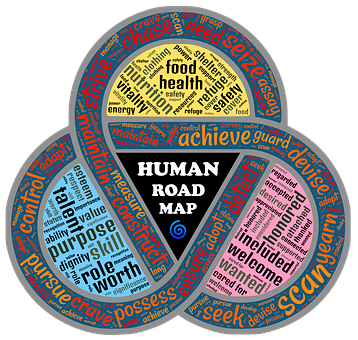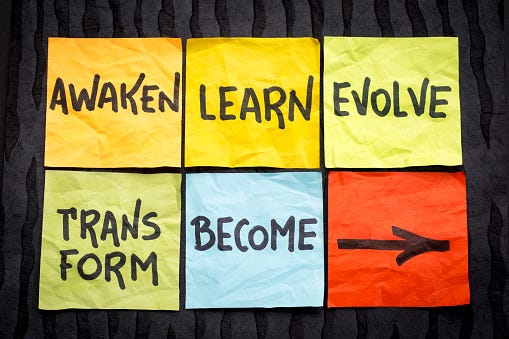Best Types of Preppers and Survivalists
A Glossary of all types of life hackers, BushCrafters and everything in between
“This newsletter serves a demographic of highly intelligent readers, deep thinkers, life hackers, preppers, survivalists. I especially focus on those with a passion for ideas, critical thinking, strategic game theory, and a desire to understand the world around them. Readers of my posts are usually tired of being patronized elsewhere by fact-less, opinionated know-nothings, misinformation, conspiracy theories, and fake news.
“Knowledge is power, wisdom brings meaning, contentment, and happiness!”
———————————————————
———————————————————
On a personal note: Please excuse grammatical errors, typos, repetition, and any general nonsense, and such in this post. I am getting a bit older now, and I have about 20,000 pages of information that must get published before I leave the mortal coil. I simply write and publish more than my humble editors are able to correct. If you find enough errors you are welcome to contact me about being an editor of my work.
Thanks for sharing this newsletter with your friends and associates - Join us for daily tips on personal development at our free Self-Improvement for Beginners Group and Forum
Click Below or cut and paste the URL to Join
The Life Strategies Playbook & Mentoring Program is a reader-supported publication. To receive new posts and support my work, consider becoming a free or paid subscriber.
https://www.facebook.com/groups/455029215769173
———————————————————
A 6 - Minute Read
There are a wide range of ideas and motivations for why a person might develop an interest in life hacking, prepperism, and survivalism. Through my research and to reduce the chance of confusion, and the making of poor choices by people reading my newsletters I felt it would be useful to create simple definitions for the 20 most commonly used terms for beginning or advanced students.
To begin, here are some definitions of basic words, terms, and categories you will likely come across in this series of books and in the prepper survivalist and life hacker community. This list is greatly expanded in the glossary you will find at the end of each book.
Back-to-the-land movement: A movement inspired by Helen and Scott Nearing, sporadically popular in the United States in the 1930s and 1970s (exemplified by The Mother Earth News magazine). These proactive soft survivalists share many of the same interests in self-sufficiency and preparedness as hard survivalists. Back-to-the-landers differ from most survivalists in that they have a greater interest in ecology, and counterculture, and are less paranoid and conspiracy-driven in their beliefs concerning the likelihood of a collapse of civil society and the financial system. Despite these differences.
BIB: Bug-in bag: A general term of a pack or list of everything you will need to safely and securely stay locked down in your home in a SHTF situation.
BOB: Bug-out bag: A pack containing everything needed to leave your home and get to a safe location until able to return safely to your home or residence. Whether heading to a BOL, Retreat, MAG, MAC or Redoubt.
Bugout: See BOB
Bushcraft: This is the use and practice of skills, thereby acquiring and developing knowledge and understanding, in order to survive and thrive in a natural environment. BushCraft is another term that had been around for a while but has gained much popularity in the prepper/survivalist community because of its use by popular and skilled survivalists. The term waspopularized in the Southern Hemisphere by Les Hiddins (the Bush Tucker Man) as well as in the Northern Hemisphere by Mors Kochanski and more recently gained considerable currency in the United Kingdom due to the popularity of Ray Mears and his bushcraft and survival television programs.
Game-based strategic thinking: A system of strategizing to maximize one’s prepping, and survivalist skills at the lowest possible cost. Looking at human interactions and SHTF situations as a type of game to be won these prepper/survivalist strategists (players) create responses to competitive situations, complex challenges, obstacles, and constraints. Game-based strategic thinking is a strongly influenced and loosely applied take on game theory that has garnered researchers over a dozen Noble Prizes.
G.O.O.D.: Get out of Dodge (city). Fleeing urban areas in the event of a disaster. Coined by James Wesley Rawles.
G.O.O.D. kit: Get out of Dodge kit. Synonymous with bug-out bag (BOB).
Hard Prepper/ Survivalist: I tend to divide survivalists into a range of categories that span from life hackers, and preppers who I call “soft” survivalists to off-grid, wilderness experts that I call “hard” survivalists. Related to Uncivilization*: WROL* and YOYO*, these are preppers and survivalists who are preparing for a where we live in a potentially lawless state of society, often connected to some great catastrophe where you are essentially on your own (in the survivalist context).
Intentional Community: A voluntary residential community designed from the start to have a high degree of social cohesion and teamwork. The members of an intentional community typically hold a common social, political, religious, survivalist, or spiritual vision, often follow an alternative lifestyle, and typically share responsibilities and property. Intentional communities can be seen as social experiments, communal experiments, or collaborative survivalist groups. The multitude of intentional communities includes collective households, cohousing communities, coliving, ecovillages, monasteries, survivalist retreats, kibbutzim, Hutterites, ashrams, and housing cooperatives
Intentional Living: Also known as Neo-Survivalism. It usually involves a communal spirit intelligently deployed through reciprocal altruism*. Neo-survivalists are very different than the caricature of most hard survivalists, a loner with the AK-15 heading to the hills with enough ammunition and pork and beans to ride out the storm.
Life hacking: Any system or practical tip, shortcut, technique, method, tool, or tactic that can help a person get something done more effectively, efficiently, precisely, productively, accurately, and with greater self-awareness.
Off-the-grid: Also called off-grid, this is a characteristic of buildings and a lifestyle designed in an independent manner without reliance on one or more public utilities. The term "off-the-grid" traditionally refers to not being connected to the electrical grid, but can also include other utilities like water, gas, and sewer systems, and can scale from residential homes to small communities. Off-the-grid living allows for buildings and people to be self-sufficient, which is advantageous in isolated locations where normal utilities cannot reach and is attractive to those who want to reduce environmental impact and cost of living. Generally, an off-grid building must be able to supply energy and potable water for itself, as well as manage food, waste, and wastewater.
Prepper: A term often used as a synonym for a type of survivalist. This word came into common usage during the early 2000s. Refers to one who is incrementally preparing or making preparations for a catastrophe. Most prepping includes stockpiling food and ammunition. Preppers often reside in urban areas. Preppers can be contrasted with hard survivalists, who focus on outdoor survival skills and extreme approaches to self-sufficiency.
Simple Living: Simple living refers to practices that promote simplicity, and self-sufficiency in one's lifestyle. Common practices of simple living include reducing the number of possessions one owns, depending less on technology and services, and spending less money. These practices can be seen throughout history, religion, art, and economics.
Reciprocal Altruism: In the context of prepperism and survivalism this is a unique and specific behavior in which one individual or group takes a short term loss so that another individual or group receives a short-term benefit. This is done with the expectation that sometime in the future these roles will be reversed. This is usually done with some boundaries and conditions.
SHTF: Shit hit/hits/hitting the fan
Simple Living: Simple living refers to practices that promote simplicity, and self-sufficiency in one's lifestyle. Common practices of simple living include reducing the number of possessions one owns, depending less on technology and services, and spending less money. These practices can be seen throughout history, religion, art, and economics.
Soft Survivalist Prepper: I tend to divide survivalists into a range of categories that span from life hackers, and preppers who I call “soft” survivalists to off-grid, wilderness experts that I call “hard” survivalists. A soft survivalist prepper tends to avoid extreme ideological thinking concerning what SHTF situations may arise but is prepared for the worst even if they do not expect the worst to happen.
Survivalism: A social movement of individuals or groups (called survivalists or preppers) who proactively prepare for emergencies, including natural disasters, as well as disruptions to social, political, or economic order. Preparations may anticipate short-term scenarios or long-term, on scales ranging from personal adversity to local disruption of services, to international or global catastrophe. Survivalism may be limited to preparing for a personal emergency, such as job loss or being stranded in the wild or under adverse weather conditions. The most extreme of survival skills are often called BushCraft.
The Takeaway
So there you have it. Now you can do some introspection and see which approach will work for you. Of course, that will change over time! I know you will enjoy the tips, techniques, methods, and shortcuts I will share in these newsletters. Once they are published I hope you will check out the book series as well beginning with The Prepper Survivalist Guidebook: Surviving Hard Times through Simple and Conscious Living Vol.1”
——————————————————————————————————————
Learn more about using game-based strategic thinking in the prepper survivialist life by clicking on the article below …
——————————————————————————————————————
Join our game-baed strategic thiking support group on Facebook by clicking on the game theory logo below…
——————————————————————————————————————
Also, check out our new Mini Podcasts - Here is a sample - Click right below….
I often use gamer psychology and patterns of play as an educational tool for people interested in learning about self-improvement, life hacking, prepperism, and survivalism
Click on the chessboard below to learn more about my Life Strategies Course and Mentoring Method
I wrote an article on game theory and logical thinking for my students. See below
Here is a short video about some of what I am working on in the realm of personal development and self-improvement.
—————————————————
Author: Hey there. My name is Lewis Harrison, and I am a proponent of Pragmatic Prepping, Sensible Survivalism, Liberated Life Hacking and Intentional Living. I am a writer, teacher, and results-oriented life coach. The author of over twenty books, numerous self-improvement, and personal development courses, and the former host of a talk show on NPR Affiliated WIOX91.3 FM I can be contacted directly at LewisCoaches@gmail.com
—————————————————
If you want to live a struggle-free life, filled with knowledge and wisdom, please consider signing up for our course Winning the Game of Life: Lewis Harrison’s Life Strategies Playbook Method from A-Z.
Click on the button just below or copy and paste the link to learn more about the course …
——————————————————
None of us can progress alone, without some skilled guidance. Are you looking for a mentor or a compassionate, results-oriented life coach? This would be a great gift to give yourself.
I’d love to work with you and help you to become more effective, efficient, productive, self-aware, and create your best, most meaningful, and purpose-filled life.
Let's schedule a 15-minute interview to determine how I can help you create a customized and personalized program for creating your best life. Email me at LewisCoaches@gmail.com
Lewis
Click on the graphic below to learn more about the Life Strategies Course
The Life Strategies Playbook & Mentoring Program is a reader-supported publication. To receive new posts and support my work, consider becoming a free or paid subscriber.
















